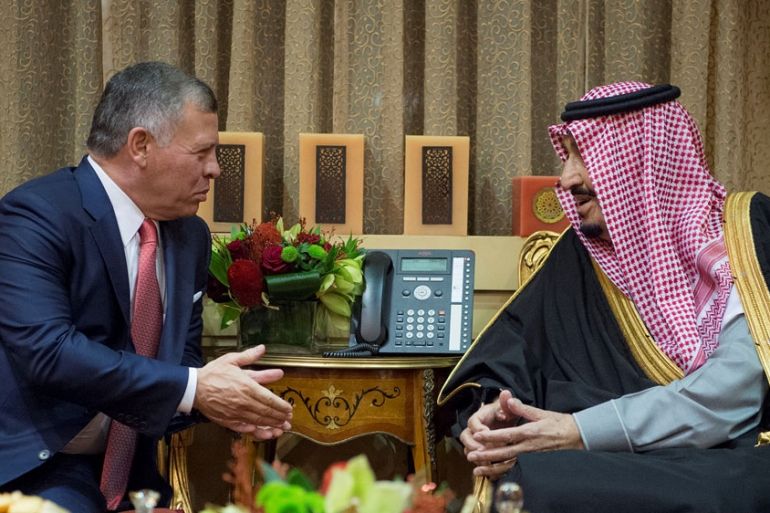Saudi Arabia to host meeting over Jordan economic crisis
The summit, which will be held in Mecca, will be attended by Jordan, the United Arab Emirates and Kuwait.

Saudi Arabia will host a regional summit to discuss the ongoing economic crisis in Jordan, where a proposed income tax rise recently triggered some of the largest protests in years.
The meeting on Sunday in Mecca will be attended by Saudi King Salman, Jordan’s King Abdullah II, Kuwait’s Emir Sheikh Sabah Al Ahmad Al Sabah and the Crown Prince of Abu Dhabi Sheikh Mohammed bin Zayed Al Nahyan.
Keep reading
list of 4 itemsEcuador weighs security, international arbitration in latest referendum
‘Triple spending’: Zimbabweans bear cost of changing to new ZiG currency
Boeing hit with 32 whistleblower claims, as dead worker’s case reviewed
The leaders agreed to meet in order to “discuss ways to support Jordan to overcome the economic crisis the country is going through,” Saudi Press Agency said on Saturday, quoting a statement from the Royal Court.
Jordan relies heavily on foreign aid, and the $3.6bn assistance programme it receives annually from the Gulf Corporation Council has not been renewed since last year.
Daoud Kuttab, a journalist based in Jordan’s capital, Amman, said most of the financial aid given to Jordan by Gulf Arab states “has dried up or gone on to specific programmes” which do not help the country’s budget.
“There are different schools of thought on this issue,” he explained. “One says that the Gulf countries support programmes like building schools and highways [in Jordan] rather than just giving them money.
“Then there are some people who think that there is some kind of a political connection to the stopping of the direct support,” Kuttab told Al Jazeera.
“The fact is Jordan is suffering because of this absence of financial aid,” he said, adding that Amman considers Arab countries have a responsibility to keep it afloat, due to its role in protecting Jerusalem’s Al-Aqsa Mosque, the third-holiest site in Islam.
Economic woes
Protests erupted in Jordan’s capital Amman and other provinces earlier in the month, calling for the government to scrap price rises and a controversial International Monetary Fund-backed income tax reform bill.
Jordan received a $723m loan from the IMF in 2016 and has put in place a three-year plan to bring down debt levels.
Austerity measures tied to the loan have seen prices of basic necessities rise across the kingdom, creating discontent over the increasing fuel and bread costs. Electricity bills, meanwhile, rose by five times in 2018 alone.
The demonstrations resulted in the resignation of Prime Minister Hani al-Mulki earlier this week, and highlighted what analysts called the “structural” problems of the country’s economy, which suffers due to regional instability, dependency on foreign aid and the high cost of hosting 650,000 Syrians refugees.
Jordan’s national debt amounts to $1.753bn, or up to 95 percent of the country’s Gross Domestic Product (GDP).
Following al-Mulki’s resignation, the Jordanian King Abdullah appointed Education Minister Omar al-Razzaz as prime minister with the task of forming a new government.
On Thursday, al-Razzaz announced that the controversial tax reform bill will be withdrawn, but the issue of balancing popular demands with the need to reduce Jordan’s public debt remains unresolved.
|
|